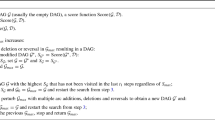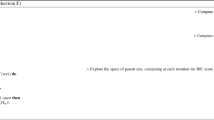Abstract
We show that the problem of finding a Bayesian network with minimum number of edges for an input data set is NP-hard. We discuss the analogies of formulation and proof of our result to other studies in the areas of Bayesian networks and knowledge discovery.
This work was partially supported by the Polish National Science Centre grant 2011/01/B/ST6/03867.
Access this chapter
Tax calculation will be finalised at checkout
Purchases are for personal use only
Preview
Unable to display preview. Download preview PDF.
Similar content being viewed by others
References
Chickering, D.M.: Learning Bayesian Networks is NP-Complete. In: Fisher, D., Lenz, H. (eds.) Learning from Data: Artificial Intelligence and Statistics V, pp. 121–130. Springer (1996)
Chickering, D.M.: Optimal Structure Identification with Greedy Search. Journal of Machine Learning Research 3, 507–554 (2002)
Chickering, D.M., Heckerman, D., Meek, C.: Large-sample Learning of Bayesian Networks is NP-Hard. The Journal of Machine Learning Research 5, 1287–1330 (2004)
Cooper, F.G., Herskovits, E.: A Bayesian Method for the Induction of Probabilistic Networks from Data. Machine Learning 9, 309–347 (1992)
Jensen, F.V.: Bayesian Networks and Decision Graphs. Statistics for Engineering and Information Science. Springer (2001)
Kloesgen, W., Żytkow, J.M. (eds.): Handbook of Data Mining and Knowledge Discovery. Oxford University Press (2002)
Neapolitan, R.: Learning Bayesian Networks. Prentice Hall (2004)
Pawlak, Z., Skowron, A.: Rudiments of Rough Sets. Information Sciences 177(1), 3–27 (2007)
Pearl, J.: Bayesian Networks: A Model of Self-activated Memory for Evidential Reasoning. In: Proc. of the 7th Conf. of the Cognitive Science Society, pp. 329–334. University of California, Irvine (1985)
Pearl, J.: Probabilistic Reasoning in Intelligent Systems: Networks of Plausible Inference. Morgan Kaufmann (1988)
Savnik, I., Flach, P.A.: Discovery of Multivalued Dependencies from Relations. Intell. Data Anal. 4(3-4), 195–211 (2000)
Shenoy, P.P.: Conditional Independence in Valuation-based Systems. International Journal of Approximate Reasoning 10, 203–234 (1994)
Ślęzak, D.: Approximate Entropy Reducts. Fundamenta Informaticae 53(3-4), 365–390 (2002)
Ślęzak, D.: Degrees of Conditional (In)dependence: A Framework for Approximate Bayesian Networks and Examples Related to the Rough Set-based Feature Selection. Information Sciences 179(3), 197–209 (2009)
Ślęzak, D.: Rough Sets and Functional Dependencies in Data: Foundations of Association Reducts. In: Gavrilova, M.L., Tan, C.J.K., Wang, Y., Chan, K.C.C. (eds.) Transactions on Computational Science V. LNCS, vol. 5540, pp. 182–205. Springer, Heidelberg (2009)
Studeny, M.: Probabilistic Conditional Independence Structures. Springer (2005)
Author information
Authors and Affiliations
Editor information
Editors and Affiliations
Rights and permissions
Copyright information
© 2012 Springer-Verlag Berlin Heidelberg
About this paper
Cite this paper
Betliński, P., Ślęzak, D. (2012). The Problem of Finding the Sparsest Bayesian Network for an Input Data Set is NP-Hard. In: Chen, L., Felfernig, A., Liu, J., Raś, Z.W. (eds) Foundations of Intelligent Systems. ISMIS 2012. Lecture Notes in Computer Science(), vol 7661. Springer, Berlin, Heidelberg. https://doi.org/10.1007/978-3-642-34624-8_3
Download citation
DOI: https://doi.org/10.1007/978-3-642-34624-8_3
Publisher Name: Springer, Berlin, Heidelberg
Print ISBN: 978-3-642-34623-1
Online ISBN: 978-3-642-34624-8
eBook Packages: Computer ScienceComputer Science (R0)




